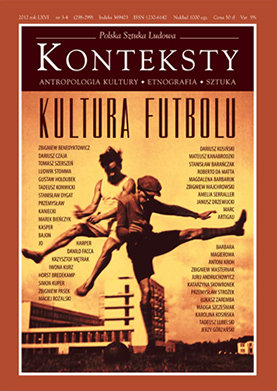Mecze i gry oświęcimskie. Piłka nożna w KL Auschwitz-Birkenau
Auschwitz Matches and Games. Football in KL Auschwitz-Birkenau
Author(s): Iwona KurzSubject(s): Anthropology
Published by: Instytut Sztuki Polskiej Akademii Nauk
Keywords: Football; History; Auschwitz; Holokaust; Anthropology
Summary/Abstract: Modern sport is the child of the same epoch that gave rise to Auschwitz. Sport entered the international arena together with nineteenth-century national renascence and the idea of the national state. Up to this day, such events are the only peacetime occasion for a regular and open unification of nation-states (Dunning). The author of the Olympic idea – Baron Pierre de Coubertin – stressed two dimensions of sports: rivalry was to become the foundation of an international harmony of nations whose force is created by training. In the development of modern societies, sport, thanks to imposed discipline, was to harden the spirit and, at the same time, develop the body of the individual, the foundation of a healthy social organism. In turn, “concentration camp” can be understood as an institution that focuses and radicalises, and brings to a visible extreme the assorted dimensions of the “normal” world of modernity, often transparent on a daily basis (Bauman, Agamben). The term “sport” functioned in the reality of Auschwitz in a double meaning. First, it denoted sports events held on a semi-legal basis, and secondly – it involved tormenting the inmates by forcing them to perform exhaustive physical exercises. The article shows the consequences of the presence of sport in concentration camp reality, and devotes most attention to boxing and football events, in particular in KL Auschwitz-Birkenau, where the football field, described by i.a. Tadeusz Borowski, was situated right next to the Judenrampe, where people condemned to death in the gas chambers got off the arriving trains.
Journal: Konteksty
- Issue Year: 2012
- Issue No: 03-04
- Page Range: 79-84
- Page Count: 6
- Language: Polish
- Content File-PDF

